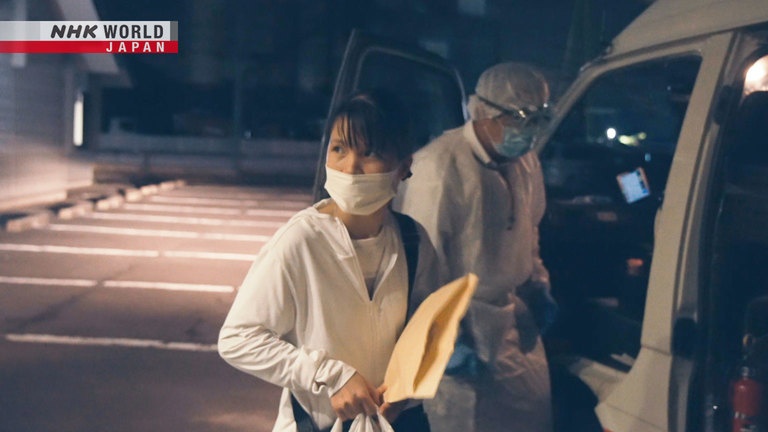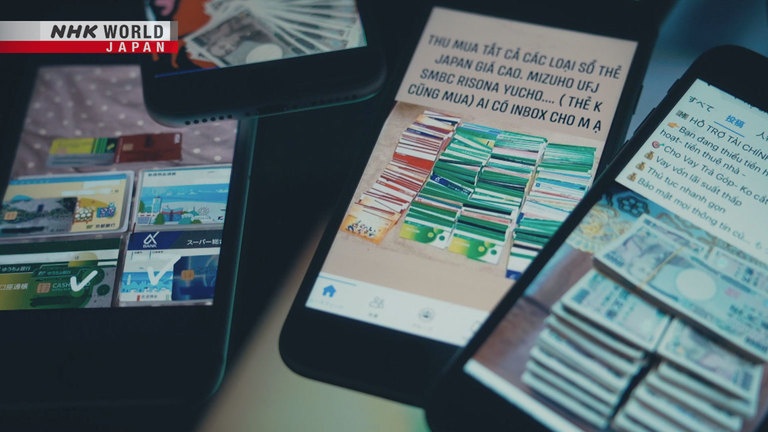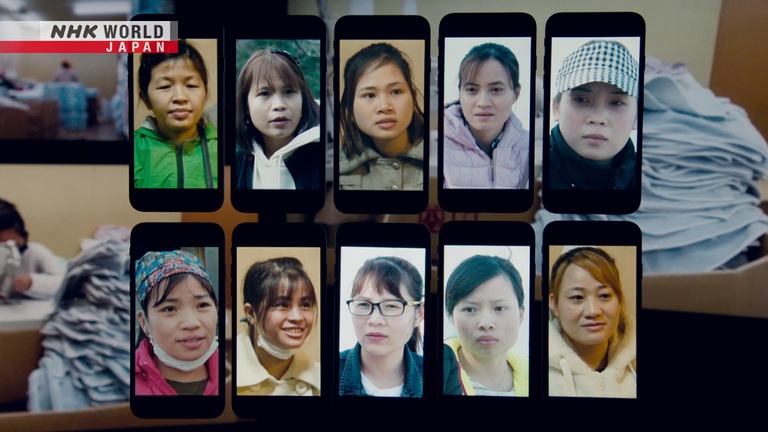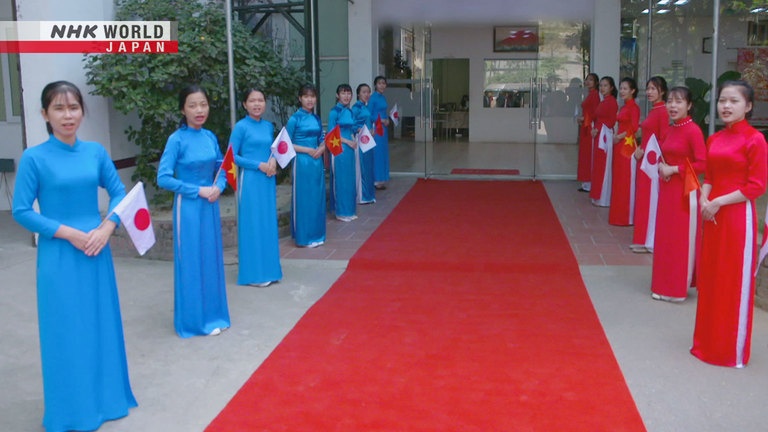"Japan is a developed country. A good country." That's what many Vietnamese people believe when they come to Japan as technical intern trainees. For four years, NHK has followed 10 Vietnamese intern trainees who arrived with a dream, but were subjected to harsh conditions, long working hours, wage theft, and violence. The COVID-19 pandemic made their lives even more difficult. Then, six of them fled from their workplace. What became of them? Our investigation uncovered the dire situation that they and many others like them face, including illegal lenders, unwanted pregnancy and abortion, and the coronavirus itself. What can be done to change this harsh reality?
The 2023 New York Festivals TV & Film Awards gold winner for best continuing news coverage.




Transcript
Walking along the riverbank in the pitch-black darkness are two Vietnamese women.
Usually there are a lot.
But not today.
None.
They came to Japan four years ago on the technical intern training program.
What are they looking for?
Bullfrogs.
What will you do with it?
Cook it with eggplant.
With wild herbs, it's delicious.
There's no work due to COVID.
Our income has plunged.
We catch frogs to eat.
Trainees like them acquire technical skills while working.
Their wages are usually around 1,400 US dollars a month.
But their work has been drastically reduced due to the COVID-19 pandemic.
They now take home less than 1/3 that amount.
We followed ten Vietnamese technical intern trainees working in Japan over the past four years.
The program that brought them here aims to increase international cooperation by transferring Japan's skills, technologies, or knowledge to people from developing countries.
But in fact, trainees are sometimes treated as sources of cheap labor in industries like agriculture, fishing, and production sewing where there's a shortage of labor.
Moreover, trainees sometimes suffer from abuse, or are subjected to long working hours and even physical violence.
The United Nations and the United States have labelled these practices "forced labor" and "human rights violations."
They've repeatedly urged improvements to the program.
As Japan's labor force continues to shrink, the technical intern training program has been expanding.
We look closely at the harsh reality these technical trainees are facing.
My name is Tien.
I came from Vietnam
as a technical trainee.
Japan is an advanced, civilized country,
where laws are respected.
I couldn't wait to come to Japan.
I was so excited.
More than anything, I wanted
to gain skills in sewing techniques.
Our initial encounter with Tien led us to follow ten Vietnamese trainees.
She has sent an urgent message to a support group pleading for help.
Sew 400 towels then fold them in an hour.
Start at 7:30 and finish by 12:30.
Understand?
It's like we're in prison.
We're forced to do so much work.
Being squeezed like lemons.
I contacted you because I'm afraid
someone might die.
Tien arrives with her colleagues at the meeting place without the company's knowledge.
What are you making?
We're sewing towels.
Long hours. Intense pressure.
Paid less than promised.
I have to put up with it
and work to pay off my debts.
I'm so sad and disappointed.
We're scolded all day long
and treated like cattle.
I came to Japan to study and work.
But they always threaten us, saying,
"We'll send you back to Vietnam."
Tien worked at a garment factory in Vietnam.
She wanted to become a technical intern trainee to acquire more advanced skills and help her impoverished parents.
In order to come to Japan, she paid a company in Vietnam 6,700 dollars in borrowed funds.
But the reality that awaited her in Japan was a far cry from what she'd envisioned.
If we don't meet the quota,
we're forced to work until morning.
We keep our screams inside.
We just hold each other and cry.
The room where we sleep
is on company property.
A lot of us from Vietnam
live in one small room.
It's really bad when it rains a lot.
We have to work in half-dried clothes.
Our clothes always smell bad
but they're all we have to wear.
This is not the life we'd dreamed of.
Before she came to Japan, she signed a contract that promised she would learn about Japanese garment sewing skills.
However...
The reality is completely different.
Since coming to Japan,
I've only been making towels.
The supervising organization told us, "If anyone asks you what you're making,
tell them women's and children's clothing."
Under the intern trainee system, "supervising organizations" licensed by the government direct and oversee the program to ensure that training is going according to plan and
the trainees aren't being forced to work under illegal conditions.
But does the supervising organization for Tien and her colleagues really know what's going on?
We confronted a representative of the organization.
Since we're doing nothing wrong,
I will answer your questions fully.
Is it your understanding that they're
sewing women's and children's clothing?
Yes. If that weren't the case, we wouldn't
issue the permission documents.
That's a matter of course.
Don't you think?
I observed things carefully there for a week.
The only items on the trucks were towels.
Many things can be made from towels.
We don't know what happens after
things leave the company.
To conduct our audit, we go to the company
and monitor them, review their documents, and of course, talk to the trainees
whenever we're there.
It's our understanding that everything is
being carried out in accordance with the law.
Following the claims by Tien and her fellow trainees, the relevant authorities launched an investigation.
Good afternoon.
We're from the investigation bureau.
Can we talk?
Let us talk with you.
Ten trainees from this factory are taken into protective custody.
The company has been barred from receiving any technical intern trainees for five years.
Authorities also revoked the license of the supervising organization.
Good afternoon.
- Who is it?
- It's Aoyama.
Hi, hello.
Please come in.
Hello.
We've got our confidence back,
and we can live with peace of mind.
We're so happy.
It's wonderful.
The ten trainees are going to search for a new place where they can learn about sewing skills.
Launched some 30 years ago, Japan's technical intern training system has expanded steadily.
Aichi Prefecture.
We'll do our best.
In 2019, the number of technical intern trainees reached 410,000, the highest ever.
Around half came from Vietnam.
Welcome everyone.
Good morning.
Many of the people who want to become technical trainees come from poor rural areas.
They learn the language and customs, and dream of success in Japan.
What kind of work
will you do in Japan?
Machinery maintenance.
My work will be metal casting.
Side dish preparation.
Pickles and egg dishes… If I have a lot of money,
I want to buy a big house.
They can work for three years in Japan and depending on the worksite, they may be able to earn over ten times what they would in Vietnam.
They'll often borrow up to 7,200 dollars for fees and other costs.
2020.
The COVID-19 pandemic was spreading.
The environment for the trainees had changed drastically.
International travel was severely restricted.
At least 57,000 people were stranded and couldn't return to their home countries.
Many trainees were suddenly dismissed because their companies had lost money or gone bankrupt.
They often ended up unemployed.
What about the ten trainees we'd been following?
We visited Tien to find out.
Where did everyone go?
They've all disappeared.
I don't know where they are.
I was lucky.
The others couldn't join
a good company like I did.
Everyone still has
debts from Vietnam.
They have to earn money
even though they've disappeared.
Tien is working at a new company and learning the skills as her original contract promised.
But she says most of her 9 fellow trainees were once again out of work.
She has no idea what's become of them.
We searched for the whereabouts of these trainees… and interviewed several other Vietnamese people.
Do you know these individuals?
I don't know any of them.
Finally, we found a Vietnamese man who said he knew them.
He's an unlicensed taxi driver.
His fares are low, so people often hire him when they want to flee from their workplace.
The company where my friends were
working went bankrupt due to COVID.
They're forced to subsist on
insects, wild grass, and frogs.
They told me while I was driving them.
Where are they staying?
I don't know the details.
My job is to take people
who've found work to their jobs.
That was all the driver told us.
After two months of searching, we found someone who worked with one of the ten trainees.
He's a man in his 20s who was himself a technical trainee.
Do you know this person?
Yes, I know her.
It's Hien.
Where did you meet her?
Awaji in Kobe.
What kind of work was it?
Chopping and peeling onions.
He was referring to Hien.
Her wages were cut and her company went bankrupt due to covid.
Hien was a nice person.
She was sociable and considerate.
Always friendly to everyone.
The man said she had disappeared from his workplace.
The boss didn't do anything to the men,
but he sexually harassed the women.
He sent them nude photos
through messaging apps.
It was really sick.
In Vietnam, I would've hit him.
Hien saw the boss making
sexual comments.
She knew he wasn't a decent man
and left after two days.
The man said he didn't know where Hien went after that, and walked away.
Because of the COVID pandemic, technical intern trainees have been moving to different places around the country.
They were taking advantage of the special visa measures offered by the government for humanitarian reasons.
Many trainees can't get a flight back home
once their training is over.
Some companies have gone bankrupt,
and trainees are dismissed.
In some cases, we allow them to change
their status of residence to extend their stay.
In principle, moving between jobs is not permitted under the technical intern training program.
But the special measures now enable trainees to change their visa status and work part-time.
Technical trainees have been rushing to immigration offices to seek new visas.
I quit my company.
There's no work and
the wages are low.
If I can get a visa,
I want to work in Tokyo.
I worked in plumbing.
The pay was low and the boss
often got angry at me so I ran away.
The pandemic brought about a major shift in their ability to freely change jobs.
All right, everyone?
Let's eat.
But an increasing number of trainees are getting trapped and impoverished.
The Japan Vietnam Tomoiki Association is an NPO that provides help and protection to technical trainees.
On this day, the group received a request for assistance.
What would you like us to do for you?
We came here today because we'd
like your help in legally getting visas so we can continue to work
and live in Japan.
The two had worked in construction-related jobs.
They're seeking help because of the situation with their wages.
They worked just seven days this month.
After social insurance and rent were deducted, they took home less than a dollar.
It's 93 yen.
You can't live on that.
It's hopeless.
I borrowed money to come to Japan
but the pay is so low, I fled in despair.
If the work were stable,
I wouldn't have left.
It cost me $8,100 to come to Japan.
They said the company also had Japanese employees, but the technical trainees bore the brunt of the cutbacks.
We Vietnamese are treated
differently from the Japanese.
We left our homes far away
to come to Japan to work.
But now the situation is bad,
and we don't know what to do.
They're looked down upon
because they're foreigners.
They're driven to disappearing
for the convenience of Japanese people.
With proper assistance, they should be
able to change jobs even during COVID.
Yoshimizu Jiho is providing support to technical trainees so they can continue to work in Japan.
Good morning.
Thank you for coming.
Four of them have gotten new jobs at this company.
Viet came to Japan two years ago.
He's been working here for the past three months.
He said he was often the victim of violence at his previous company.
They hit me.
After Yoshimizu helped me,
my view of Japanese people changed.
Only a few are like those
at the previous company.
Here, I've met lots of
kind Japanese people.
While searching for the missing trainees, we uncovered a new clue.
Many Vietnamese use Facebook to find work.
One Vietnamese online community is called "Bo doi," or soldier.
Assembling pachinko boards: 11 dollars an hour.
Hotel housekeeping: 10 dollars an hour.
The site is filled with job openings like this.
There are also ads for illegal activities such as buying and selling bank passbooks, or lending money with passports as collateral.
We contacted a Vietnamese man who used to provide illegal loans to technical trainees.
How much can they borrow
with a passport?
For technical trainees, from $910
to, at most, $2,700.
The interest is 10% for 10 days.
The trainees borrow because
they're in a tight spot.
Particularly those who have disappeared.
They can't care much about
their personal circumstances.
They can't even think about the future.
Even if they can't pay us back,
we have their personal information.
We make contracts with
one of the main cellphone carriers.
Then we apply for credit cards and buy
things on Amazon or other sites.
Once we get a cellphone number, we can
spend $9,000 to $14,000 on these sites.
This man, too, was once a technical intern trainee who disappeared.
With the COVID restrictions, I couldn't
afford the high cost of living in Japan.
I had no choice since I had no residence,
not even a place to sleep.
It was either eat or be eaten.
Of the missing technical trainees, Hien was one who disappeared after losing her job as a result of the pandemic.
We found out where she was living.
Hello. Is Hien here?
Oh, she's over there.
Good evening.
It's been awhile.
Please come in.
After she lost her job, Hien got a special measures visa from the government.
She has searched for work through social media, moving around, going from job to job.
After fleeing, I realized I'd put myself
in an unstable situation.
There are times when I have work.
When I don't, I just stay home.
Sometimes I wasn't paid.
Other times I was underpaid.
My position got weaker.
I can't ask for anything. I regret it.
I'm very sad.
Now I have no one close to me at all.
There are some good Japanese people
and some bad ones.
I think I must have been born
under a bad star.
Thank you.
Hien said, "If possible, I still want to work in Japan."
Her goal now is to learn Japanese and get a longer-term visa.
One person who's helping the technical trainees is Professor Saito Yoshihisa.
One trainee sent him a message.
It's from Anh. She's got COVID
and needs help.
She says she's coughing
and having difficulty breathing.
Anh is one of the trainees we've been following.
I want to hear how she's doing.
How do you feel?
It may be COVID,
but I still don't know.
Technical trainees are eligible for national health insurance.
But since Anh has changed her visa status, she's now no longer covered.
"Matters concerning coronavirus..."
We search for a place that will see her right away.
However...
A Vietnamese technical intern trainee
has COVID symptoms.
I'd like to know if the office
can give her a test.
Today is Saturday.
The city's COVID center won't be able to test her until Tuesday.
Would it be difficult for your hospital
to provide a test?
"The person in charge is off today."
"We do COVID testing, but we ask people
with fevers or subjective symptoms to go to the Fever Consultation Center."
We can't find a place where Anh can be tested.
Hello?
It's the seventh place we called.
"If she doesn't have health insurance,
she'll have to pay the full cost."
"The actual cost for just the
PCR test is $150."
"With additional medical exams and medication,
it can cost close to $270."
Anh only has $90 which she borrowed from a friend.
We rush over to help her.
It's 6:00 p.m.
Anh's PCR test is finished.
How do you feel?
I have a cough.
I'm shivering and feel bad.
I got an exam and a PCR test,
but I still don't have the results.
I'm worried I might not recover.
I'm scared.
The people she's working with at her part-time job had developed fevers.
Anh's fever and cough started three days ago.
The result was positive.
If she has a place to live,
she should self-isolate there.
If she doesn't, she should stay at a hotel.
We'll contact the health center.
It's a pity.
The health center has arranged for her to recover at a hotel.
Anh entered a two-week quarantine period.
This last-resort clinic was found by chance.
And pure chance enabled her
to contact supporters like us.
I'm really glad things ended up like this.
It's difficult for foreigners with
visa problems, no work, or no Japanese, and no place to stay
to be able to find such a clinic.
One month later.
Hi, Anh, how are you?
- Are you better?
- Yes, I am.
Anh has recovered.
She's starting another part-time job.
I owe $1,750 in Vietnam.
After COVID, another $1,750. in Japan.
I still want to stay here and work to pay off
all my debts in Vietnam and Japan.
I want to find a way
to get a different visa.
- Thank you.
- Take care of yourself.
You too.
Many technical trainees who changed their visa status during COVID lost their health insurance.
They turn to support organizations for help when they can't pay their medical bills or are seriously injured.
That includes women who are pregnant.
On this day, Yoshimizu, the support group director, is helping a Vietnamese woman who is nearing her due date.
The pregnant woman, Hoa, makes ends meet by working part-time jobs.
Hoa says that the father of the child is Japanese.
But after she told him she was pregnant, he stopped contacting her.
She's thinking about putting the baby up for adoption.
I thought about getting an abortion,
but it was too late.
I decided to have the child
although I didn't want to.
I don't have money, my visa will expire soon,
I don't have steady work.
My only choice is to have someone else
raise the child because I can't.
This will be our first time
putting a child in foster care.
She's said she doesn't even need
to see the child's face, which is a little hard for me to understand.
But I think the best thing for her will be
to put the baby in foster care straightaway without even breastfeeding.
That's what we'll try
to help her with this time.
Hoa's been looked after for four days.
She's increasingly avoiding contact with the other pregnant women and spending time by herself.
Are you all right?
Not feeling well?
Do you feel sick?
Is something bothering you?
Why are you crying?
What's wrong?
Why are you crying?
Don't cry.
What's wrong?
Did something bad happen?
Are you worried?
What are you worried about?
I want to raise my baby.
You want to raise your child?
- But I don't have any money.
- You don't?
Don't worry about money.
It would be better for you
to raise your child.
We'll help you.
Let's do that.
It will be better to raise
your child by yourself.
She's very troubled.
She just burst into tears.
We're worried too.
Of course she's more troubled.
Living alone probably made her think
adoption was the only way.
But here she saw how other
women are giving birth in Japan.
Now that she knows
She can get help, and there were other options,
she became confused.
Hoa started crying.
I thought she wanted to say something.
I'm glad now.
It's March 2022.
Commercial international flights to Vietnam had already resumed.
Among the passengers is Anh, who caught COVID six months ago.
Don't you have any luggage?
No.
I don't have much. Only this.
Since I moved around a lot,
I threw away almost everything.
I probably have less luggage
than anyone else on this flight.
Anh came to Japan four years ago to acquire sewing skills.
She wasn't paid fully for the long hours she worked or for overtime.
At another company where she interned, she was let go because of the COVID pandemic.
She was able to repay her debts, but she couldn't send money back to Vietnam or put anything into savings.
How do you feel about staying
in Japan for 4 years?
I am disappointed in Japan.
I'm happy to return home.
My technical training didn't go well.
Even after fleeing, life was unstable.
I'm sad that it didn't work out like the others.
I wanted to hurry home.
I got a plane ticket
so I decided to go home.
I was unlucky.
Anh returned to Vietnam.
"I'm tired," she said.
I don't have the energy to try hard anymore.
These are the ten technical intern trainees we followed.
2 trainees, including Anh, have returned to Vietnam.
Under the special measures enacted because of the COVID pandemic, Tien is planning to continue working as a technical trainee until next year.
Hien studied Japanese and passed a Japanese language test.
She obtained a different kind of visa and can work in Japan for another five years.
Congratulations.
Hoa gave birth to a healthy baby.
Her name is An.
In Vietnamese, An means "peaceful."
Hoa is going to live with her baby for a while in a shelter run by a support organization.
If the father can't be located, Hoa won't be able to stay in Japan.
Foreign technical intern trainees have long been helping to support Japanese industry.
But many of them have repeatedly seen their hopes for a better future denied.
How should Japan treat its intern trainees?
What can be done to change this harsh reality so they can pursue their dreams?
In July 2022, the Japanese government
announced that it would launch a full-scale review
of the technical intern training program.